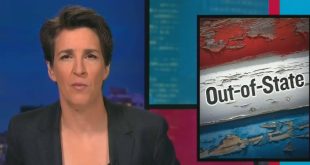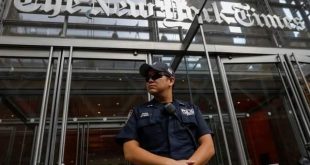Through four years as Donald J. Trump’s vice president, or perhaps three years and 350 days, Mike Pence brandished a peerless talent: insisting that all was going smoothly amid plain evidence to the contrary.
His 2024 campaign, he has long insisted, is going smoothly.
“I have great confidence in Republican primary voters,” he said in an interview, riding to an Iowa hog roast last weekend. “I’m confident we’re going to get a fresh look.”
It seemed notable that Mr. Trump, never shy about knocking anyone he views as a threat, had barely bothered to attack him in the race to that point.
It was early, Mr. Pence suggested.
“I think we’re coming,” he said calmly, “to a fork in the road.”
The fork has arrived.
As the former lieutenant to the Republican front-runner and a critical witness to that front-runner’s alleged crimes against democracy, Mr. Pence is campaigning now as many things: anti-abortion warrior, unbending conservative, believer in “heavy doses of civility.”
Yet he is running most viscerally, whether he intends to or not, as a cautionary tale — a picture of what can happen when anyone, even someone as loyal as he was, defies Mr. Trump.
“Anyone who puts themselves over the Constitution should never be president,” Mr. Pence said on a campaign conference call on Wednesday, during which supporters were reassured that he was on track to qualify for the first Republican debate. “Anyone who asks someone else to put them over their oath to the Constitution should never be president again.”
At minimum, he has gotten his former running mate’s attention.
“I feel badly for Mike Pence,” Mr. Trump posted on Wednesday on his social media site, Truth Social, repeating unfounded election claims. His former vice president, he said, was “attracting no crowds, enthusiasm or loyalty from people who, as a member of the Trump administration, should be loving him.”
Mr. Pence’s early difficulties are not shocking. Mr. Trump continues to dominate among Republicans, and much of the party’s base despises Mr. Pence for his lone act of major public defiance: resisting efforts to reverse Mr. Trump’s 2020 election loss.
But to see Mr. Pence up close, at stops across Iowa and New Hampshire in recent weeks, is to absorb the bracing particulars of a campaign not sparking — the creaky score of polite clapping in modest rooms — and of a candidate convinced he will be judged kindly by history, unable to hustle that history along.
His most prominent turns this summer have been in court documents, not in early states. Many key details in the federal indictment against Mr. Trump, which said that Mr. Pence took “contemporaneous notes,” are culled from conversations between them. At one point, the indictment recounted, Mr. Trump let fly a three-word rebuke: “You’re too honest.”
If so, this does not seem to have done Mr. Pence many favors as a candidate (though the campaign has already repurposed the “Too Honest” label for T-shirts and hats). His fund-raising has been meager. He is polling, at best, a very, very distant third or fourth.
While his team says the campaign has gone according to plan, noting his late entry in the race compared with some competitors’, seven other Republicans say they have qualified for the debate later this month, a group that includes two rivals who joined the primary the same week he did in June.
At a candidate forum last week in Des Moines, where multiple extended ovations greeted Mr. Trump, Mr. Pence strained to coax applause at times even while serving up the reddest of meat. (“Americans are facing one man-made crisis after another, and that man’s name is Joe Biden,” he said, to near silence.)
He has failed to dissuade voters from ascribing foreboding meaning to the mundane. (“Is that a sign?” a woman whispered in Hudson, N.H., noticing a small snake near Mr. Pence’s foot as he spoke outdoors.)
He has compelled some supporters to worry openly about the size of his venues.
“So tiny — you’re a vice president, for heaven’s sake,” Shirley Noakes, 84, said before he arrived to another crowd of dozens in Meredith, N.H.
For those who once considered Mr. Pence the chief enabler in Mr. Trump’s White House — buoying him through relentless executive chaos that rattled democratic institutions well before January 2021 — any campaign stumbles amount to a well-earned comeuppance.
Mr. Trump was the nation’s essential man, Mr. Pence long attested, and more than that, “a good man.” (He does not use that adjective anymore.)
Asked in the interview if he saw himself as an example to other Republicans who remain devoted to the former president, Mr. Pence did not say no. He reiterated his pre-Jan. 6 dedication to Mr. Trump “through thick and thin, until my oath to the Constitution required me to do otherwise.”
“I would leave to others,” he said, “any judgment about what that says about the president.”
Among some who admire Mr. Pence, for his stand at the Capitol and otherwise, his campaign thus far has been confounding, a mission without a near-term political rationale.
“He doesn’t really have a unique selling proposition,” said Newt Gingrich, the former House speaker, who has both praised Mr. Pence for what he did on Jan. 6 and been accused of helping to perpetuate Mr. Trump’s election lies. “In terms of John F. Kennedy’s ‘Profiles in Courage,’ I think that Pence is a very admirable person. In terms of that being a way to win the Republican nomination, I think it doesn’t have any traction.”
Mr. Pence said he thought Mr. Gingrich was “not giving Republican primary voters enough credit.”
But regardless, Mr. Pence said, this race is a calling for him and his wife, Karen Pence, no matter how it ends. “Campaigns should be about something more important than the candidate’s election,” he said.
And this one, at least, is poised to answer some questions in the interim.
What do Americans think of Mike Pence now, without someone else blocking their view? What should they think?
“You want to take a picture or something?” he asked with a smile recently in Barrington, N.H., arriving unannounced to a home décor shop whose Republican proprietors appreciated the visit, they said later, but did not support him. “Just in case I turn out to be somebody important.”
Trump’s opposite ‘in every way’
Mr. Pence looks like a presidential candidate who knows that he looks like a presidential candidate.
“Out of central casting,” Mr. Trump used to say of him, in happier times, and the Pence 2024 team seems inclined to sustain the aesthetic.
He still shakes hands with his whole body — leaning, nodding, left palm on a voter’s upper back.
He still remembers names and local favorites, pandering with impunity. (In New Hampshire: “I stopped by Dunkin’ Donuts the other day …” In Iowa: “I look forward to seeing you at Casey’s and Pizza Ranch…”)
He is still liable to point straight ahead suddenly, as if drawing a firearm in the credits of a Hoosier James Bond, for the closing flourish of his remarks.
“The best” — point! — “days for the greatest nation on earth are yet to come.”
Mr. Pence, 64, has imagined himself as a prospective president for some time, entertaining White House runs during his years as a congressman and Indiana governor. In his 2022 memoir, he said he had developed “a healthy distrust of my own ambition.”
Much of Mr. Pence’s career can read now as a study in suboptimal timing, with a politician who could seem almost ostentatiously out of step with the moment.
In 2004, dismayed at the spending decisions of a Republican administration, Mr. Pence said he felt like “the frozen man” as a lonely voice for fiscal restraint in Congress. “Frozen before the revolution, thawed after it was over,” he said then. “A minuteman who showed up 10 years too late.”
In 2016, he endorsed Senator Ted Cruz of Texas for president days before Mr. Cruz dropped out. “Cruz’s vision of our party hewed the closest to mine,” he reasoned in his book.
It was Mr. Trump who gave Mr. Pence a timely lifeline anyway, inviting him on the ticket during a tough re-election race in Indiana.
For all of Mr. Trump’s volatility, people who know both men said, their relationship was often buttressed by genuine affection.
Robert Jeffress, the senior pastor at First Baptist Church in Dallas, recalled Mr. Trump’s glee at introducing him to Mr. Pence shortly after their election in 2016. “He said, ‘Robert, he is absolutely fantastic,’” Mr. Jeffress remembered. “‘He is opposite me in every way.’”
Surely it helped relations that the dynamic between the two was never ambiguous: There was one star, one principal, one sun around which the operation would orbit.
In his stump speech, Mr. Pence speaks about being “well-known” but “not known well,” a man often seen standing quietly behind another man.
“Just a half-step off,” he told a couple dozen supporters in Ames, Iowa, “off the shoulder of the president.”
In the interview, he noted: “I don’t believe that we ever agreed to a single profile interview in four years. Because I never wanted the story to be about me.” (As it happened, Mr. Trump did not want that, either.)
Eventually, nightmarishly, the story became about him.
Mr. Pence said he sensed in the days after the Capitol riot that Mr. Trump was “deeply remorseful about what had occurred.”
The former president offers no apology for his role in the violence that surrounded Mr. Pence and his family that day.
Breaking a vise grip he helped create
Four words accompany almost any public appearance by Mr. Pence.
“So help me God,” he said in Nevada, Iowa, convening with first responders.
“So help me God,” he said in Napa, Calif., at a gathering of Catholic conservatives.
“So help me God,” he said in Meredith, N.H. “Which happens to be the title of my book.”
Friends say Mr. Pence was always cleareyed about — and unmoved by — his steep odds in 2024. That he joined the field anyway, they suggest, says more about his faith than his ego.
“My sense is there was a really long and interesting discussion with God,” said Gov. Chris Sununu of New Hampshire, who decided against a run himself, speaking highly of Mr. Pence after watching the candidate forum in Des Moines.
But a vexing political irony for Mr. Pence has persisted: Mr. Trump’s unyielding support among many conservatives — a vise grip that the former vice president must break to have any electoral hope — can be traced in large measure to Mr. Pence.
Mr. Jeffress said the symbolic resonance of Mr. Pence’s 2016 selection by Mr. Trump was immeasurable to evangelical voters especially, enshrining a stalwart of the right beside an ideologically flexible nominee. “And now, the overwhelming majority of evangelicals still support Trump,” he added, “because he has a track record.” (Mr. Jeffress is supporting Mr. Trump.)
Mr. Pence suggested that this history is partly why he felt called to the 2024 campaign. In 2016, he said, Mr. Trump made “a tacit promise” to govern as a conservative.
“He makes no such promise today,” Mr. Pence said.
As other candidates, including Mr. Trump, hedge and deflect their positions on abortion restrictions, Mr. Pence has eagerly promoted his role in vetting the Trump-nominated Supreme Court justices who helped overturn Roe v. Wade.
“He has forced the other contenders to step up and say where they stand,” said Kristan Hawkins, president of Students for Life of America. “I think he has the potential to do that as well on other issues.”
A smattering of encouragement has come from the nonvoting set. In Meredith, where several guests thanked Mr. Pence for his actions on Jan. 6, a 15-year-old named Quinn Mitchell sent the Q. and A. session into a brief hush.
Given the former president’s conduct, he asked, “do you think Christians should vote for Donald Trump?”
Mr. Pence held for a beat, proceeding carefully.
“I’m running for president of the United States because I think I should be the next president,” he said to applause.
The young attendee understood, he said later, that the candidate was probably best served avoiding a clean yes or no.
But when the two met afterward, Mr. Pence took care to commend the questioner.
“You have a bright future,” he wrote on a poster the teen had brought. “God bless.”
 Top Naija News: Nigerian News, Breaking News Nigeria and World News Top Naija News is a daily news publication in Nigeria, delivering the latest breaking news in Nigeria and around the world.
Top Naija News: Nigerian News, Breaking News Nigeria and World News Top Naija News is a daily news publication in Nigeria, delivering the latest breaking news in Nigeria and around the world.



